Just one weekend remains in Meanwhile Park’s world premiere production run of two one-act plays: Andrea Berting’s Red Devil and Nathan Johnson’s Vacation.
Only limited availability remains for tickets. The production runs through July 20. Meanwhile Park, which is near the Herman Franks Dog Park, opens at 8:30 p.m. on performance nights, and the shows start as the light fades. Please note that this is a private ticket event and is open to those 21 and older. For more information, see the Meanwhile Park website.
The Utah Review presents reviews of these two outstanding plays.
ANDREA BERTING: RED DEVIL
In Andrea Berting’s tight, smart Red Devil, Emmie stands out in the hospital’s chemo infusion lab. A skilled social media influencer, Emmie (Laura Elsie Chapman), 23, arrives like a tornado in the lab. Diagnosed with triple negative breast cancer, she is destined for the Red Devil, among the center’s most intense chemo regimens. While Val (Reb Fleming), who’s three times Emmie’s age and is enduring her own chemo regimen, is impressed and taken with the young woman’s gusto as an AYA (adolescent/young adult) breast cancer patient, cantankerous Rose (Vicki Pugmire), a 75-year butch lesbian who really is not that much different from Emmie, is initially irked by the seemingly self-absorbed, unashamedly bold newest fellow patient.
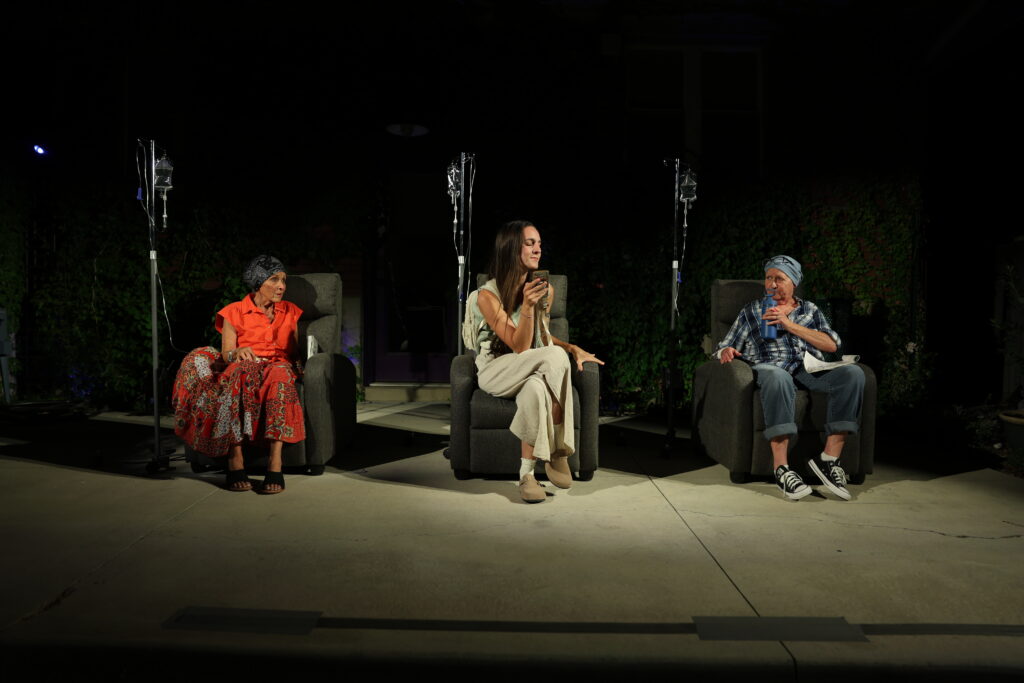
Red Devil’s opening night premiere at Meanwhile Park, directed by Teresa Sanderson, could not have been more perfect. With sharp timing and astute readings of their assigned characters, the actors animate Berting’s wonderfully crafted story, inspired by her own experiences with treatment for breast cancer. Red Devil stands out for emphasizing that regardless of the gap of not just one but two generations at play, the three women realize how much they truly empathize with and recognize each other’s vulnerabilities, dreams and disappointments of life.
Val, with Stage 4 metastatic breast cancer, must contend with the bitterness of her husband’s decision to abandon her after fifty years of marriage. She has become good friends with Rose, who is fighting her own cancer battle alone. It has been a decade since Rose’s spouse died from the same disease but Rose clearly enjoys Val’s company and friendship, especially for sharing in her love of solving crossword puzzles, a pastime she enjoyed with her wife.
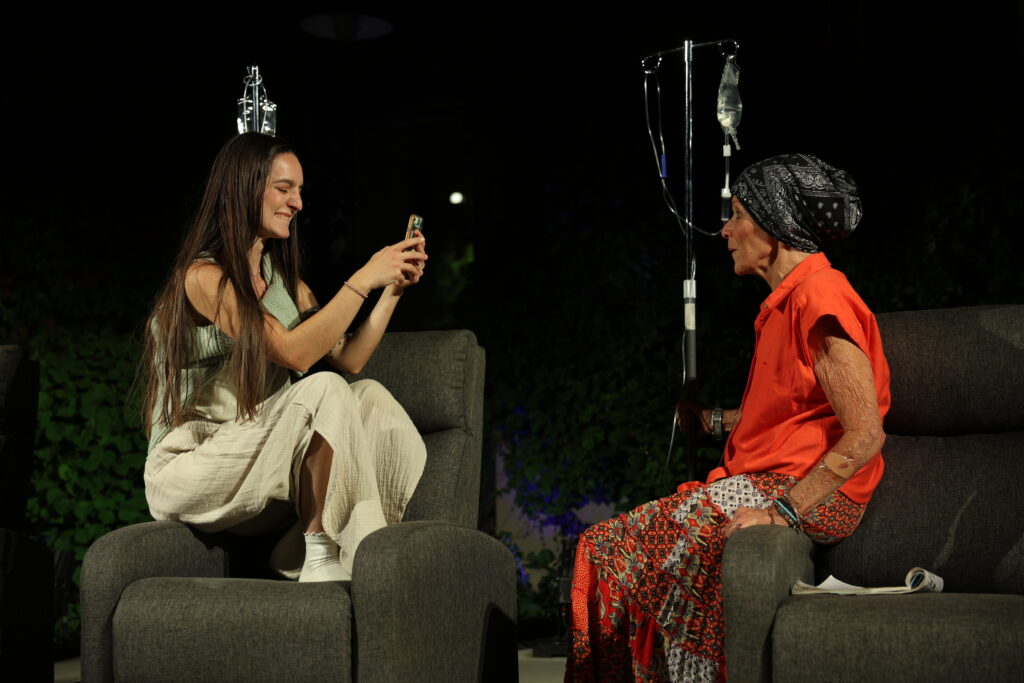
Chapman’s performance as Emmie is electrifying. When she enters the stage for the first time, recording content for her first experience as a breast cancer patient undergoing chemo, she commands every audience member’s attention as much as Rose and Val.
Emmie doesn’t miss a beat. She immediately picks up on Rose’s growing love of Val. Letting Rose know that she is queer just as well, Emmie says, “I saw you getting ready to go whoop her husband’s ass. Well, ex-husband. And the way you look at her! Girl, you’ve got it bad.” Likewise, when Rose faces the possibility of her chemo regimen being discontinued because her insurance provider refuses to extend paying for the treatment, Emmie quickly orchestrates a crowdfunding social media campaign to assist, which impresses both of her older newfound friends.
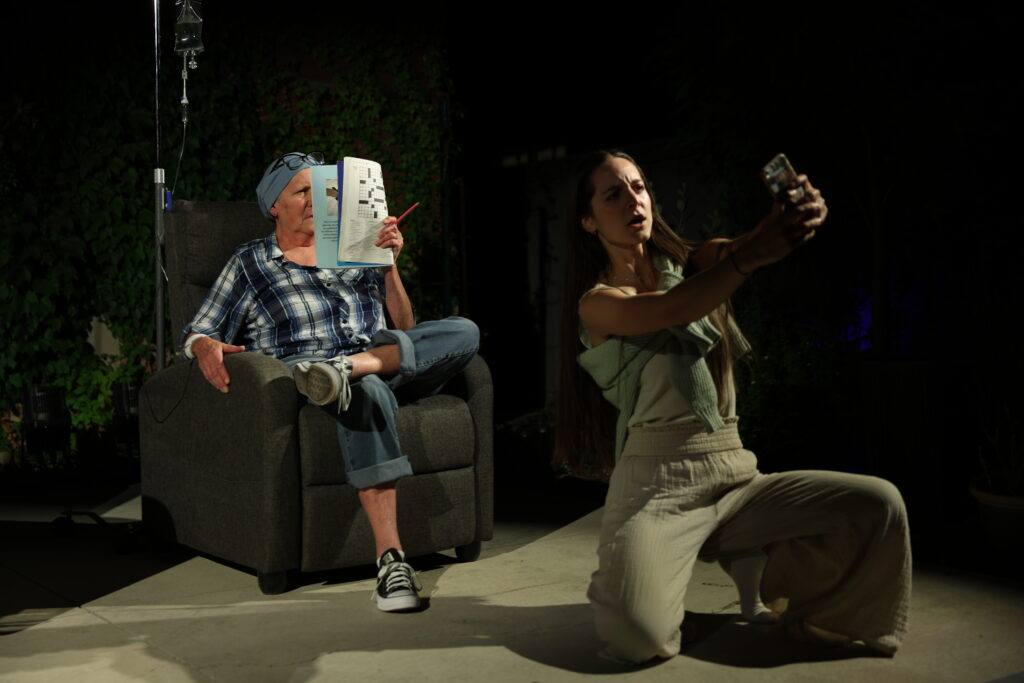
Rose gradually but stubbornly lets her guard down and slowly warms to Emmie while Val relishes the visceral spirit the young woman has brought to the chemo lab. Rising to the creative brief’s emotional challenges, Chapman sets the tone on stage with magnificent impact. In subtle ways, she lets enough glimpses of her own vulnerabilities peek through her self-assured veneer. While she has legions of followers online, Emmie has no family, friends or other close persons nearby who will be able to help her when she is experiencing the worst side effects of the Red Devil regimen.
Whether it is a comedic or dramatic line, Chapman’s visceral instincts kick into gear. A striking moment comes when she explains how her online community is the only support system she considers reliable. “My real life friends —if you can call them that— they all got freaked out and ghosted me. It was all, ‘Oh my God, we love you so much’ to start, but I guess seeing me actually get sick was too much to handle.” Pugmire captures the characteristic essence of Rose who still cannot see any value in publicly sharing photos of the pain cancer patients endure. As Val, Fleming eloquently telegraphs her comprehension of Emmie’s sense of abandonment. Chapman’s most incisive delivery brings home the brute reality of one of the play’s sharpest lines: “All the, like—pink-ribbon warrior sisters bullshit just pisses me off so much. This is ugly, and— and, I don’t know. People need to see it for what it is— a tragedy.”
As noted in a preview at The Utah Review, Berting continues to expand Red Devil into a ninety-minute script. “I already have 65 pages done,” she added. Indeed, this premiere of the shorter one-act version Red Devil confirms its prospects as a fully-fledged play, as it explores, with exquisitely balanced wit and emotional sincerity, the possibilities for love when shadows of death are large enough not to be ignored.
NATHAN JOHNSON: VACATION
If the ghost of Quentin Crisp, by chance, was hovering over the opening night premiere of Nathan Johnson’s fabulous Vacation, a one-act play about two husbands who have embarked on a romantic getaway and come to realize that each one has concocted a plot to murder the other, the legendary gay raconteur would have been smiling broadly.
Crisp, whose works included The Naked Civil Servant, How To Become A Virgin and Resident Alien, easily came up with gems such as ”If at first you don’t succeed, failure may be your style,” “There is no need to do any housework at all. After the first four years the dirt doesn’t get any worse,” or “Never keep up with the Joneses. Drag them down to your level.”
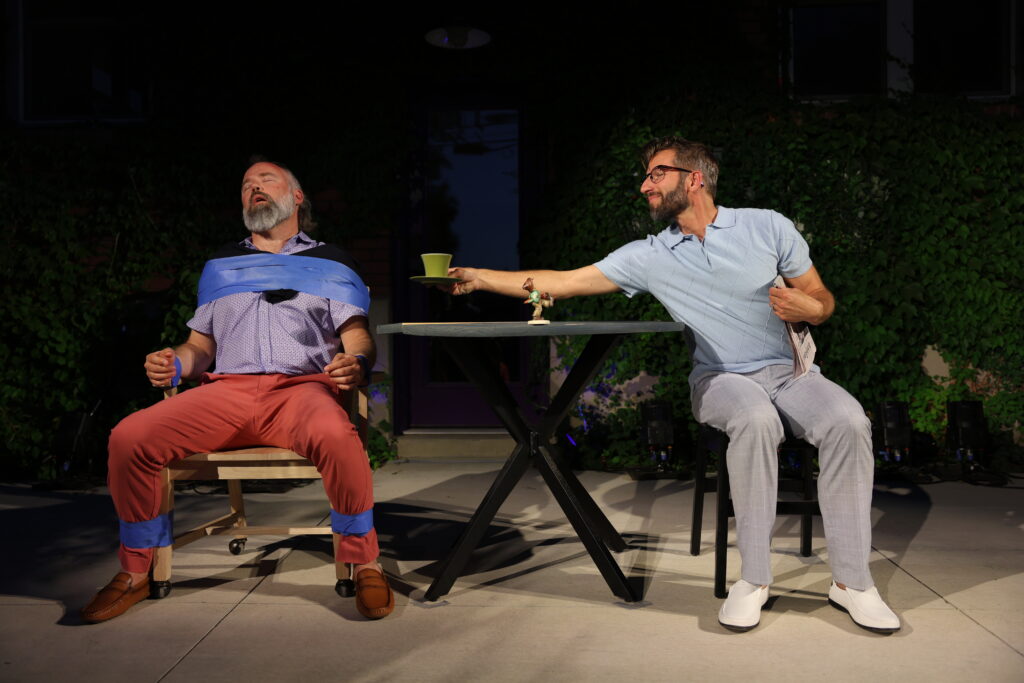
In Vacation, Johnson masters the distinctly queer double-conscious elements of camp that allows two gay men such as the play’s characters of Barrett and James to realize that as utterly farcical as it seems for two people to communicate in a relationship that initially promised long-term love, for whatever reason both of them might possibly continue the fruitless mission, even if means forever trading barbs and daggers between each other. As noted in a preview at The Utah Review, Johnson has inculcated the sensibilities of mentors such as queer artist icon Charles Busch, while also concocting the vintage wry wit that was found in some of the best mystery and thriller episodes Alfred Hitchcock produced for television.
Indeed, in the premiere production directed by Jason Bowcutt, Alexis Baigue as Barrett and Dan Beecher as James do worthy justice to a script brimming with sleek, sassy camp. Set in the kitchen of a rented cottage in The Berkshires, the story features Barrett, a fifty-something elitist snob who comes from old family money, and his husband, James, who is in his late forties. James came from a different socioeconomic life but he also has unashamedly adopted all of the sensibilities of a rich lifestyle. Their characters acknowledge the inevitable disappointment of their long-term union by playing out a bracing stylized game that admits enough frivolity into the mix which sometimes risks fomenting into something more ominous but then ebbs into playfully vicious territory.
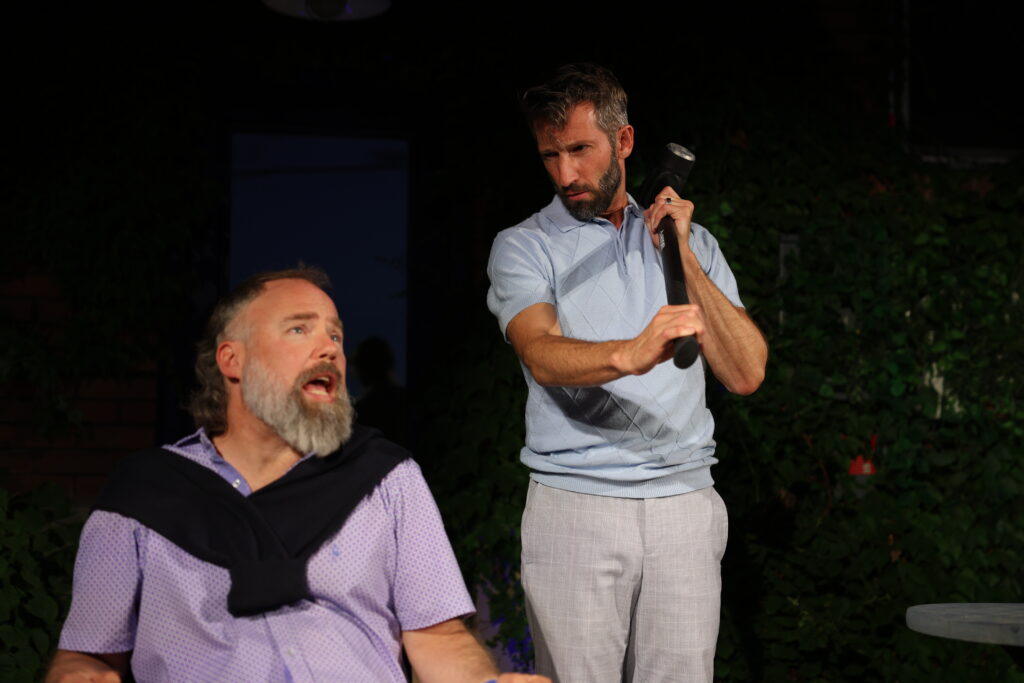
The play opens with Barrett sitting at the table reading The New York Times and sipping coffee. A Hummel figurine sits on the table and nearby is a pricey leather bag. Across the table, James is out cold, gagged and taped to a chair. When James comes to, he learns that his face is hurting because he was struck by the Hummel “we just antiqued.” Beecher skillfully extracts the peculiar affectations of James’ speech patterns: “I was concussed!” and “I went vasovagal.”
It becomes quickly apparent that both men had the same idea when they prepared to spend the weekend at an idyllic resort in The Berkshires. Barrett (with Baigue in his finest work in the role) presses James about the presence of a sledgehammer, which was not originally in the house, and a large dildo. James apparently has envisioned an utterly ignominious end for his husband.
Melodrama aside, the 25-minute script gallops along with quips, daggers and poison darts that underscore why Barrett and James were never suited for life as a bland, heteronormative couple. James tells Barrett that if he messed up his face by striking him with the rare Hummel figurine, he was getting a new one. To which Barrett replies, “Our wedding album would argue you already have.” When confronted by Barrett about the sledgehammer, James makes the case that it was for protection: “Two gays alone in the woods. You’ve seen Deliverance.” One example of the numerous spicy and devilish exchanges ensues:
BARRETT: I didn’t know the Berkshires were rife with inbred
psychopaths.
JAMES: Idyllic places are the rifest.
BARRETT: You were born here, so that tracks.
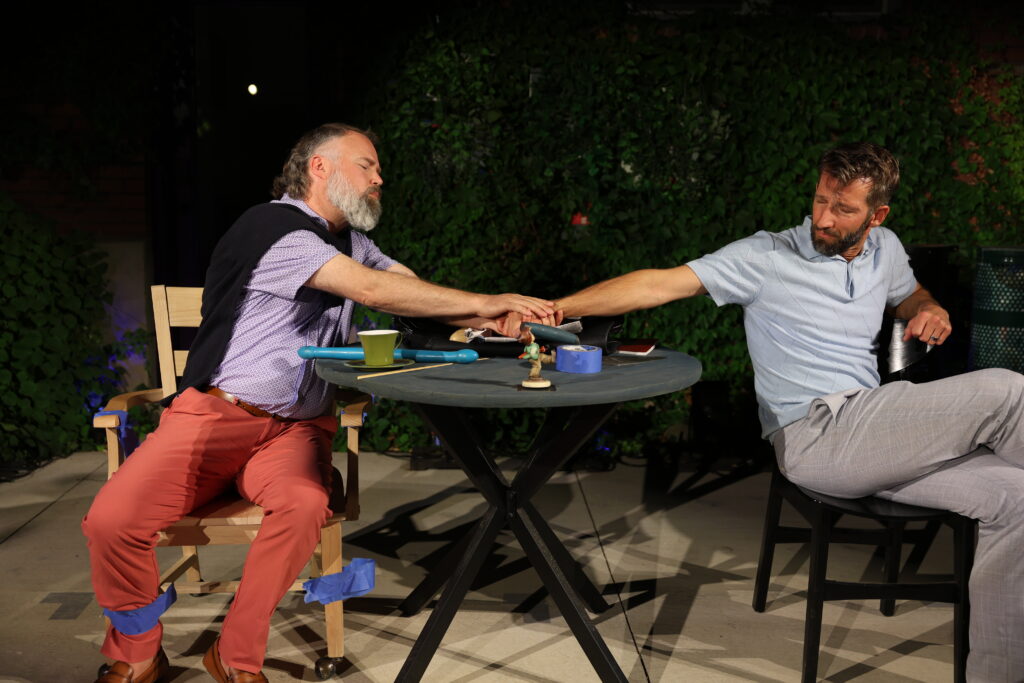
Vacation is actually part of a full play, where the two characters as well as a third one (Tristan, who is Barrett’s office assistant and is referred to in Vacation) exist in the work-in-progress The Dummies Guide to Murdering Your Husband. As Johnson explained in an interview published elsewhere, “Interestingly, until Dummies Guide, all of my plays were dramas/thrillers and my friends kept asking why I wasn’t writing comedies. I told them I didn’t write comedy because I wasn’t funny. I wrote this to shut them up.”
Meanwhile Park’s scintillating production of Johnson’s Vacation provides the proof of concept about why we should anticipate Johnson’s full-length version of a wonderfully imaginative play that rebukes the orthodoxy of respectability that has attempted to sanitize gay male culture. In his 2012 book How to Be Gay, David Halperin wrote, “Gay male culture has …elaborated a distinctive, dissident perspective on romantic love [i.e., erotic desire], a camp perspective, which straight people often regard as cynical… [and] precisely because its irony—which emphasizes the performativity of romantic roles—seems to them to undermine the seriousness and sincerity of love, and thereby demean it.” Camp, as Halperin explains, breaks “the romantic monopoly on it,” making it “more widely available” for “social uses,” ending “the antagonism between love [i.e., erotic desire] and society, between love [i.e., erotic desire] and friendship, between the happy couple and the community.”
In his 1987 song which Sting wrote in honor of Crisp, Englishman in New York, the musician was inspired by the gay icon’s story of living through decades where homophobia was everywhere in British society. Among the most important verses in the song are the lines: “It takes a man to suffer ignorance and smile./Be yourself no matter what they say.”
The gist of that sentiment percolates throughout this marvelous little romp. May the stories, travails and poison dart wars of Barrett and James (and Tristan) find plenty of theatrical homes just as welcoming as Meanwhile Park.

